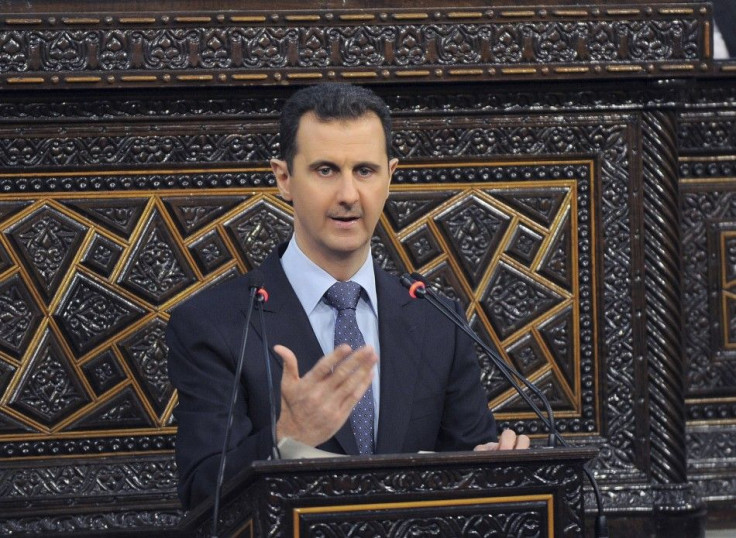Assad Says Syrian Protests Different From Those In Egypt, Tunisia; 'Friends Of Syria' To Meet In Paris

Syrian President Bashar al-Assad says the anti-government protests in his country are not comparable to the Arab Spring protests elsewhere, and that it's not people, but terrorists, who want to oust him from power.
Everybody was calculating that I would fall in a small amount of time. They all miscalculated, Assad told the Turkish daily Cumhuriyet which published an interview of the Syrian leader over the past three days.
They wanted to bring people out into the streets in large numbers just like in Egypt and Tunisia, Assad said. However they were not successful.
Assad said the opposition aimed to divide Syria or to create internal war and that the protesters were paid an equivalent of $10 to $100 to participate in demonstrations.
The big game targeting Syria is much bigger than we expected, Assad said, as reported by Reuters.
The aim is to break up Syria or trigger a civil war. The fight against terrorism will continue decisively in the face of this. And we will defeat terror.
We are now waging war with terrorist groups, not the people. And we will wage war because we have to protect ourselves and our people.
The Syrian leader said that unlike the late Shah Mohammad Reza Pahlavi of Iran, who was ousted in the Islamic Revolution of 1979, he commanded majority support among the Syrians.
He (Shah) led the most important country in the region, he had a powerful army and was supported by the whole world. So was he able to stand up against the people? No, Assad said.
If I had been in the same situation, that is if I didn't have the people behind me, I could not have resisted. I would have been overthrown. How come I'm still standing?
He said the peaceful demonstrations turned violent because the opposition wanted to form liberated areas by arming certain regions, like the Benghazi model in Libya, CNN reported.
Syrian forces prevented the forming of such areas, but now they are at a new stage: Assassinations, bombing state institutions, massacres targeting civilians and kidnappings have begun.
Assad said Turkey was providing support to the Syrian rebels and Prime Minister Recep Tayyip Erdogan was two-faced by pursuing sectarian agenda and persuading Syrian government to introduce political reforms.
Turkey has given all kinds of logistical support to the terrorists killing our people, Assad said.
With his desire from the beginning to interfere in our internal affairs, unfortunately, in the subsequent period he (Erdogan) has made Turkey a party to all the bloody acts in Syria.
Turkey and Syria had close diplomatic ties before the uprising began in March last year, and Erdogan, once on a visit to Damascus, had referred to Assad as his brother. Both leaders were even caught on camera holidaying together with their families.
However, the friendly ties, which started deteriorating since the beginning of the Syrian uprising, gave way to war cries when Syrian forces shot down a Turkish military jet on the Mediterranean near the joint border late last month.
Although Turkey hasn't declared war on Syria, Erdogan last week called Syria a clear and present danger for Turkey and all military vehicles approaching the 900-kilometer Turkish border with Syria were to be considered a threat.
Assad never made any mention of the U.N.-sponsored international agreement to set up a transitional government in Syria, based on mutual consent between the regime and opposition groups.
Meanwhile, U.S. Secretary of State Hillary Clinton arrived in Paris to attend Friends of Syria summit Friday, led by France, the U.S., Britain, Germany, Saudi Arabia and Qatar.
At that meeting, the Secretary will consult with her colleagues on steps to increase pressure on the Assad regime and to support UN-Arab League Special Envoy Annan's efforts to end the violence and facilitate a political transition to a post-Assad Syria, State Department Victoria Nuland was quoted as saying by CNN.
Russia and China, U.N. Security Council members with veto powers, will not attend the summit, saying that the Friends of Syria meet is detrimental to peaceful settlement in Syria.
Russia insists that the Friends of Syria is detrimental to peaceful settlement of the political crisis in Syria as on the whole its activities are directed at finding various loops to overthrow the current regime of President Bashar al-Assad, instead of scrupulously implementing Kofi Annan's peace plan, Russia's official news agency Ria-Novosti reported.
© Copyright IBTimes 2024. All rights reserved.












